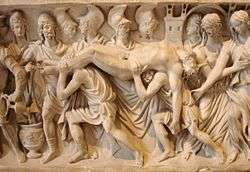Hector (given name)
Hector (/ˈhɛktər/) is an English, French, Scottish, and Spanish given name. The name is derived from the name of Hektor, a legendary Trojan champion who was killed by the Greek Achilles. The name Hektor is probably derived from the Greek ekhein, meaning "to check", "restrain". In Scotland, the name Hector is sometimes an anglicised form of the Scottish Gaelic Eachann, and the pet form Heckie is sometimes used. The name of Sir Ector, the foster father of King Arthur, is also a variant of the same.[1]
 | |
| Gender | masculine |
|---|---|
| Origin | |
| Meaning | prob. ekhein "to check", "restrain" |
| Region of origin | Greece, England, France, Scotland, Spain |
| Other names | |
| Derived | Hektor |
| Related names | Eachann; Hector (surname) |
Cognates
People with the name
- Héctor Ávila, Dominican boxer
- Héctor Ballesteros, Colombian weightlifter
- Héctor Bellerín, Spanish football (soccer) player
- Hector Boece, a Scottish philosopher and historian
- Hector Berlioz, French composer
- Hector (Toe) Blake, Canadian hall of fame hockey player and coach
- Hector Luis Bustamante, Colombian actor
- Héctor Carrasco, Dominican baseball player
- Héctor Castaño, Colombian road cyclist
- Hector Charlesworth, Canadian writer, editor and critic
- Hector Crawford, Australian radio and television producer
- Héctor del Curto, Argentine tango bandoneon player
- Héctor Delgado, reggaeton artist
- Héctor Elizondo, Puerto Rican-American actor
- Héctor Ferri, Ecuadorian football (soccer) player
- Hector Halsall, English rugby league footballer with Swinton RLFC in the 1920s
- Hector Hetherington, Scottish philosopher
- Héctor King, Mexican recording artist
- Héctor Lavoe, Puerto Rican salsa singer
- Hector Lombard, Cuban-Australian mixed martial artist
- Hector Munro Macdonald, Scottish mathematician
- Hector Carsewell Macpherson, Scottish writer and journalist
- Hector Lewis MacQueen, Scottish legal academic and member of the Scottish Law Commission
- Héctor Moreno (footballer), Mexican football (soccer) player
- Hector Munro, 8th laird of Novar, a Scottish-born British soldier who became the ninth Commander-in-Chief, India
- Hector Hugh Munro, British writer who used the pseudonym Saki
- Héctor Noguera, Chilean television, film and theatre actor
- Hector Ó hEochagáin, Irish radio and television presenter
- Héctor Palacio, Colombian road racing cyclist
- Hector de Saint-Denys Garneau, Canadian poet
- Héctor Soto, Puerto Rican volleyball player
- Héctor Thomas, Venezuelan decathlete
- Héctor Timerman, Argentine foreign minister
- Hector Tyndale, American military officer
- Héctor Velásquez, Chilean boxer
- Héctor Vidal Martínez, Paraguayan football (soccer) midfielder
- Héctor Vilches, Uruguayan football (soccer) player
- Héctor Yan (born 1999), Dominican Republic professional baseball player
Arthurian legend
- Sir Ector
- Hector de Maris
Fictional characters
- Monomial characters
- Hector, minor character in the book series A Series of Unfortunate Events
- Hector (Ambrosia Mascot), parrot, unofficial mascot of games company Ambrosia Software
- Hector (Castlevania), from Castlevania: Curse of Darkness
- Hector (Fire Emblem), from the Fire Emblem video game franchise
- Hector, a scary truck in the British children's television series Thomas & Friends; see Rolling stock (Thomas and Friends)
- Hector (Marvel Comics), a Marvel Comics superhero
- Hector: Fat Arse of the Law, in the adventure video game Hector: Badge of Carnage
- Hector, a polite robot of the father and son android pair Hector and Vector in "Greetings from Earth" (1979), an episode of the Battlestar Galactica (1978 TV series)
- Hector, the evil robot in the film Saturn 3
- Hector, a character in the film Coco
- Monomial with descriptor
- Hector the Bulldog, in Looney Tunes cartoons
- Hector the Cat, a mascot for the teaching of road safety to children in Australia
- Hector the Dog, in the British children's television series Hector's House
- Binomial characters
- Hector Alembick, character from King Ottokar's Sceptre
- Hector Barbossa, in the Pirates of the Caribbean film series
- Hector Bowen, aka Prospero the Enchanter, from the novel The Night Circus
- Hector Ruiz, from the American television series The Electric Company
- Hector Cruz, from the American animated television series Ozzy & Drix
- Hector Garcia, a character from Zits
- Hector Gonzales, in the film For Your Eyes Only
- Hector Hall, a DC Comics character
- Hector Hammond, a DC Comics supervillain.
- Hector Ricardo, a minor character in the Lorien Legacies series
- Hector Williams, one of the main characters in the American television show The Unit
- Hector "Zero" Zeroni, a character in the novel Holes and its film adaption
- Polynomial characters
- Hector Con Carne, the main character from the American animated series Evil Con Carne
See also
- Hector (disambiguation), other things named Hector on Wikipedia
References
- A Dictionary of First Names. Oxford University Press. ISBN 0-19-280050-7.
- Woulfe, Patrick; Slevin, Gerard (1974). Irish names for children (Revised ed.). Gill and Macmillan. p. 18. ISBN 978-0-7171-0697-4.
This article is issued from Wikipedia. The text is licensed under Creative Commons - Attribution - Sharealike. Additional terms may apply for the media files.